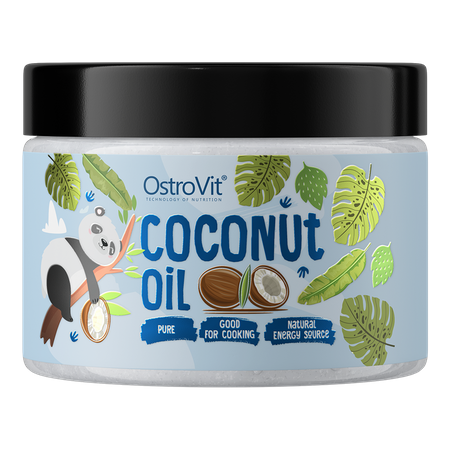Coconut oil
Coconut oils are products that are still talked about a lot. Some claim that they are unhealthy and increase the risk of developing many diseases, while others suggest that coconut oils are a wealth of valuable ingredients that can positively affect our health. How is it really? Should coconut oil be part of our daily diet?
What are coconut oils?
Coconut oils are obtained from the pulp of coconut palm nuts. The coconut itself appears on the list of superfoods products, because under the thick, inconspicuous shell there is a white flesh full of valuable nutrients.
Coconut oils are distinguished by their versatile use. They are used both in the kitchen for preparing dishes and in cosmetics. Interestingly, coconut oils are characterized by a high smoke point, which means that they break down into glycerol and free fatty acids only at temperatures above 175 degrees Celsius. Thus, despite the increase in temperature, they retain nutritional values for a long time.
At room temperature, coconut oil has a white color and a solid form, which as the temperature rises becomes more yellow and liquid.
Opinions about the beneficial properties of coconut oil are divided. Some believe that since the product is a source of saturated fatty acids, its participation in the diet should be limited. Others, however, suggest that the saturated fatty acids contained in coconut oil are distinguished by a different structure, because the product consists primarily of medium-chain fatty acids that do not adversely affect the body.
Regardless of who is right, using coconut oil, moderation should be maintained, because it is a source of fat that contributes significant amounts of calories to the body.
Types of coconut oil
The beneficial properties of coconut oil depend on how it is produced and production methods. There are two types of coconut oils - cold-pressed oils and refined oils.
Cold-pressed coconut oil is the unrefined oil that is the least processed and therefore the most valuable. It is distinguished by its coconut-nutty taste and smell as well as the richness of valuable nutrients.
Refined coconut oil on the other hand, is a product that has undergone a refining process along with bleaching and deodorization. This means that all impurities and odours have been removed from the product. Such oil is distinguished by a mild taste. The refining process does not change the fatty acid profile in the product. However, it contributes to reducing the amount of nutrients it contains.
Coconut oil - a wealth of fats
90% coconut oil is made up of saturated fatty acids, of which more than 60% are medium-saturated fatty acids such as caprylic, lauric and capric acids.
In coconut oils we also find essential fatty acids, such as oleic, linoleic or alpha-linolenic acid.
In addition, product contains B vitamins, vitamin C and E, as well as potassium, calcium, magnesium and phosphorus.
Properties and application of coconut oil
Long-chain fatty acids are digested quite long, while medium-chain fatty acids found in coconut oil, due to the smaller size of molecules, are digested much faster and transported directly to the liver. Thus, they are a great source of energy.
This feature is used especially in the menu of athletes, for whom coconut oil is a quick source of energy necessary to make an effort.
In traditional folk medicine, coconut oil has been used to fight infections. This is due to the fact that the product has antibacterial, antiviral and antifungal properties. Research suggests, however, that coconut oil does not adversely affect the intestinal microflora.
Coconut oil can also have a positive effect on the level of skin hydration, prevent its dryness and improve its functions. In addition, the product, due to the content of caprylic and lauric acids, can soothe skin problems and reduce its inflammation.
Coconut oil is widely used in cosmetics also due to the fact that it helps in proper hair care and can positively affect the fight against dandruff. In addition, thanks to the content of antioxidants, it can neutralize free radicals and reduce oxidative stress. Coconut oil can also slow down the aging process of the skin.
Although it is a high-energy product, it can help reduce body weight and burn fat and improve metabolism. In conducted on this subject studies however, small portions of coconut oil were used, which replaced other fats in the diet.
Coconut oil - always in moderation
Coconut oil, due to its fatty acid profile, seems to be a valuable ingredient that can positively affect the condition of our skin, as well as our well-being. However, it should be remembered that it is a high-energy product, rich in saturated fatty acids, which consumed in excess can contribute to the development of many diseases.
Therefore, when deciding to use the benefits of coconut oil, it is worth paying attention that the daily intake of the product is not more than 3-4 tablespoons.
To improve the absorption of valuable nutrients contained in coconut oil, it is recommended to consume it during meals.


